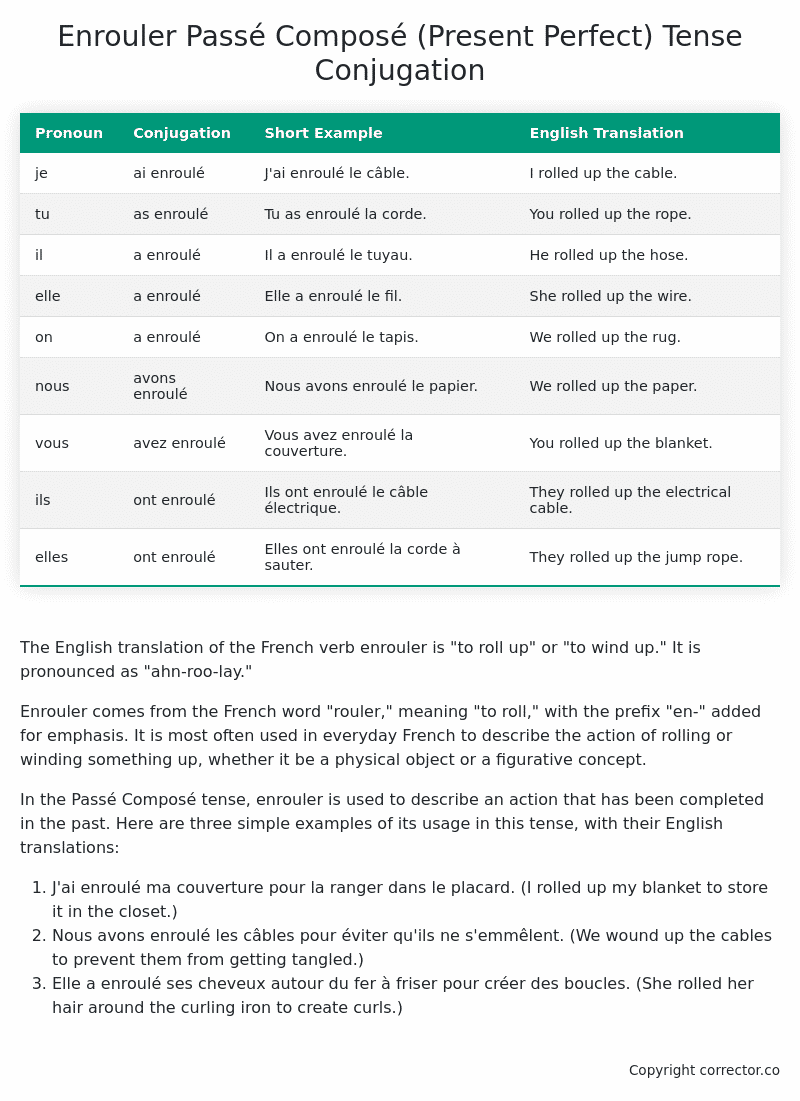Passé Composé (Present Perfect) Tense Conjugation of the French Verb enrouler
Introduction to the verb enrouler
The English translation of the French verb enrouler is “to roll up” or “to wind up.” It is pronounced as “ahn-roo-lay.”
Enrouler comes from the French word “rouler,” meaning “to roll,” with the prefix “en-” added for emphasis. It is most often used in everyday French to describe the action of rolling or winding something up, whether it be a physical object or a figurative concept.
In the Passé Composé tense, enrouler is used to describe an action that has been completed in the past. Here are three simple examples of its usage in this tense, with their English translations:
- J’ai enroulé ma couverture pour la ranger dans le placard. (I rolled up my blanket to store it in the closet.)
- Nous avons enroulé les câbles pour éviter qu’ils ne s’emmêlent. (We wound up the cables to prevent them from getting tangled.)
- Elle a enroulé ses cheveux autour du fer à friser pour créer des boucles. (She rolled her hair around the curling iron to create curls.)
Table of the Passé Composé (Present Perfect) Tense Conjugation of enrouler
| Pronoun | Conjugation | Short Example | English Translation |
|---|---|---|---|
| je | ai enroulé | J’ai enroulé le câble. | I rolled up the cable. |
| tu | as enroulé | Tu as enroulé la corde. | You rolled up the rope. |
| il | a enroulé | Il a enroulé le tuyau. | He rolled up the hose. |
| elle | a enroulé | Elle a enroulé le fil. | She rolled up the wire. |
| on | a enroulé | On a enroulé le tapis. | We rolled up the rug. |
| nous | avons enroulé | Nous avons enroulé le papier. | We rolled up the paper. |
| vous | avez enroulé | Vous avez enroulé la couverture. | You rolled up the blanket. |
| ils | ont enroulé | Ils ont enroulé le câble électrique. | They rolled up the electrical cable. |
| elles | ont enroulé | Elles ont enroulé la corde à sauter. | They rolled up the jump rope. |
Other Conjugations for Enrouler.
Le Present (Present Tense) Conjugation of the French Verb enrouler
Imparfait (Imperfect) Tense Conjugation of the French Verb enrouler
Passé Simple (Simple Past) Tense Conjugation of the French Verb enrouler
Passé Composé (Present Perfect) Tense Conjugation of the French Verb enrouler (this article)
Futur Simple (Simple Future) Tense Conjugation of the French Verb enrouler
Futur Proche (Near Future) Tense Conjugation of the French Verb enrouler
Plus-que-parfait (Pluperfect) Tense Conjugation of the French Verb enrouler
Passé Antérieur (Past Anterior) Tense Conjugation of the French Verb enrouler
Futur Antérieur (Future Anterior) Tense Conjugation of the French Verb enrouler
Subjonctif Présent (Subjunctive Present) Tense Conjugation of the French Verb enrouler
Subjonctif Passé (Subjunctive Past) Tense Conjugation of the French Verb enrouler
Subjonctif Imparfait (Subjunctive Imperfect) Tense Conjugation of the French Verb enrouler
Subjonctif Plus-que-parfait (Subjunctive Pluperfect) Tense Conjugation of the French Verb enrouler
Conditionnel Présent (Conditional Present) Tense Conjugation of the French Verb enrouler
Conditionnel Passé (Conditional Past) Tense Conjugation of the French Verb enrouler
L’impératif Présent (Imperative Present) Tense Conjugation of the French Verb enrouler
L’infinitif Présent (Infinitive Present) Tense Conjugation of the French Verb enrouler
Struggling with French verbs or the language in general? Why not use our free French Grammar Checker – no registration required!
Get a FREE Download Study Sheet of this Conjugation 🔥
Simply right click the image below, click “save image” and get your free reference for the enrouler present perfect tense conjugation!

Enrouler – About the French Passé Composé (Present Perfect) Tense
Formation of the Passé Composé
Set the auxiliary verb with either
Conjugate the auxiliary verb
Add the past participle
Common everyday usage patterns
Narrating Past Events
Sequential Actions
Describing Completed Actions
Interactions with other tenses
Imperfect Tense
Conditional and Future Tenses
Summary
I hope you enjoyed this article on the verb enrouler. Still in a learning mood? Check out another TOTALLY random French verb conjugation!


